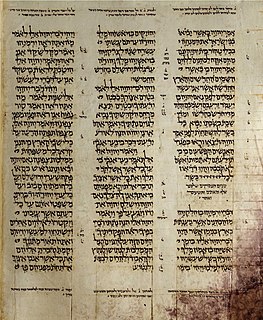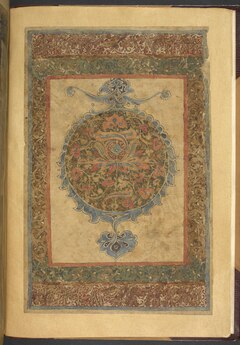
Jeremiah 1 is the first chapter of the Book of Jeremiah in the Hebrew Bible or the Old Testament of the Christian Bible. This book, one of the Nevi'im or Books of the Prophets, contains the prophecies attributed to the prophet Jeremiah. This chapter serves as an introduction to the Book of Jeremiah and relates Jeremiah's calling as a prophet.
Isaiah 44 is the forty-fourth chapter of the Book of Isaiah in the Hebrew Bible or the Old Testament of the Christian Bible. This book contains the prophecies attributed to the prophet Isaiah, and is a part of the Books of the Prophets.
Isaiah 46 is the forty-sixth chapter of the Book of Isaiah in the Hebrew Bible or the Old Testament of the Christian Bible. This book contains the prophecies attributed to the prophet Isaiah, and is a part of the Books of the Prophets. Isaiah 40-55 is known as "Deutero-Isaiah" and dates from the time of the Israelites' exile in Babylon.
Isaiah 54 is the fifty-fourth chapter of the Book of Isaiah in the Hebrew Bible or the Old Testament of the Christian Bible. This book contains the prophecies attributed to the prophet Isaiah, and is one of the Books of the Prophets. Chapters 40-55 are known as "Deutero-Isaiah" and date from the time of the Israelites' exile in Babylon.
Isaiah 62 is the sixty-second chapter of the Book of Isaiah in the Hebrew Bible or the Old Testament of the Christian Bible. This book contains the prophecies attributed to the prophet Isaiah, and is one of the Books of the Prophets. Chapters 56-66 are often referred to as Trito-Isaiah. In chapters 60-62, "three magnificent chapters", the prophet "hails the rising sun of Jerusalem’s prosperity".
Isaiah 64 is the sixty-fourth chapter of the Book of Isaiah in the Hebrew Bible or the Old Testament of the Christian Bible. This book contains the prophecies attributed to the prophet Isaiah, and is one of the Books of the Prophets. Chapters 56-66 are often referred to as Trito-Isaiah. This chapter contains "a prayer for help" in a format which T. K. Cheyne describes as "a liturgical psalm".

Jeremiah 2 is the second chapter of the Book of Jeremiah in the Hebrew Bible or the Old Testament of the Christian Bible. This book contains prophecies attributed to the prophet Jeremiah, and is one of the Books of the Prophets. Chapters 2 to 6 contain the earliest preaching of Jeremiah on the apostasy of Israel. Verses 2:1 to 3:5 dramatize the ending of "marriage" between Yahweh and Israel.

Jeremiah 4 is the fourth chapter of the Book of Jeremiah in the Hebrew Bible or the Old Testament of the Christian Bible. This book contains prophecies attributed to the prophet Jeremiah, and is one of the Books of the Prophets. Chapters 2 to 6 contain the earliest preaching of Jeremiah on the apostasy of Israel.

Jeremiah 5 is the fifth chapter of the Book of Jeremiah in the Hebrew Bible or the Old Testament of the Christian Bible. This book contains prophecies attributed to the prophet Jeremiah, and is one of the Books of the Prophets. Chapters 2 to 6 contain the earliest preaching of Jeremiah on the apostasy of Israel. This chapter is sub-titled "The Justice of God’s Judgment" in the New King James Version.

Jeremiah 29 is the twenty-ninth chapter of the Book of Jeremiah in the Hebrew Bible or the Old Testament of the Christian Bible. It is numbered as Jeremiah 36 in the Septuagint. This book compiles prophecies attributed to the prophet Jeremiah, and is one of the Books of the Prophets. This chapter records several "letters reported by the third-person narrator": from Jerusalem, Jeremiah sent a letter to the people in the Babylonia exile and he responded to a letter about him from Shemaiah.

Jeremiah 9 is the ninth chapter of the Book of Jeremiah in the Hebrew Bible or the Old Testament of the Christian Bible. This book contains prophecies attributed to the prophet Jeremiah, and is one of the Books of the Prophets.

Jeremiah 11 is the eleventh chapter of the Book of Jeremiah in the Hebrew Bible or the Old Testament of the Christian Bible. This book contains prophecies attributed to the prophet Jeremiah, and is one of the Books of the Prophets. This chapter includes the first of the passages known as the "Confessions of Jeremiah".

Jeremiah 16 is the sixteenth chapter of the Book of Jeremiah in the Hebrew Bible or the Old Testament of the Christian Bible. This book contains prophecies attributed to the prophet Jeremiah, and is one of the Books of the Prophets. In the first part of this chapter, Jeremiah is instructed to adopt a lifestyle which will serve as a "symbolic enactment of God's word", comparable to the instructions given to other prophets: see Hosea 1:2–9, Isaiah 8:3–4 and Ezekiel 24:15–24.

Jeremiah 17 is the seventeenth chapter of the Book of Jeremiah in the Hebrew Bible or the Old Testament of the Christian Bible. This book contains prophecies attributed to the prophet Jeremiah, and is one of the Books of the Prophets. This chapter includes the third of the passages known as the "Confessions of Jeremiah".

Jeremiah 19 is the nineteenth chapter of the Book of Jeremiah in the Hebrew Bible or the Old Testament of the Christian Bible. This book contains prophecies attributed the prophet Jeremiah, and is one of the Books of the Prophets.

Jeremiah 24 is the twenty-fourth chapter of the Book of Jeremiah in the Hebrew Bible or the Old Testament of the Christian Bible. This book contains prophecies attributed to the prophet Jeremiah, and is one of the Books of the Prophets. This chapter concerns Jeremiah's vision of two baskets of figs.

Jeremiah 44 is the forty-fourth chapter of the Book of Jeremiah in the Hebrew Bible or the Old Testament of the Christian Bible. This book contains prophecies attributed to the prophet Jeremiah, and is one of the Books of the Prophets. This chapter is part of a narrative section consisting of chapters 37 to the present one. Chapters 42-44 describe the emigration to Egypt involving the remnant who remained in Judah after much of the population was exiled to Babylon. The Jerusalem Bible describes this chapter as "the last episode of Jeremiah's ministry".

Jeremiah 28 is the twenty-eighth chapter of the Book of Jeremiah in the Hebrew Bible or the Old Testament of the Christian Bible. The material found in Jeremiah 28 of the Hebrew Bible appears in Jeremiah 35 in the Septuagint. This book contains prophecies attributed to the prophet Jeremiah, and is one of the Books of the Prophets. This chapter contains a confrontation between prophets Jeremiah and Hananiah: Hananiah's false prophecy is responded by Jeremiah's answer, Jeremiah 28:1-9. Hananiah breaks Jeremiah's yoke, Jeremiah foretells an iron yoke, and Hananiah's death, Jeremiah 28:10-17.

Jeremiah 30 is the thirtieth chapter of the Book of Jeremiah in the Hebrew Bible or the Old Testament of the Christian Bible. It is numbered as Jeremiah 37 in the Septuagint. This book contains prophecies attributed to the prophet Jeremiah, and is one of the Books of the Prophets. The Jerusalem Bible refers to chapters 30 and 31 as "the Book of Consolation", and Lutheran theologian Ernst Hengstenberg calls these two chapters "the triumphal hymn of Israel’s salvation". This chapter contains the promises to restoration.

Jeremiah 31 is the thirty-first chapter of the Book of Jeremiah in the Hebrew Bible or the Old Testament of the Christian Bible. It is numbered as Jeremiah 38 in the Septuagint. The book contains prophecies attributed to the prophet Jeremiah, and is one of the Books of the Prophets (Nevi'im). This chapter is notable for the passage about the "New Covenant" (31:31-34) of God with His restored people and the quoting of 31:15 in the “Massacre of the Innocents" narrative. The Jerusalem Bible refers to chapters 30 and 31 as "the Book of Consolation", and Lutheran theologian Ernst Hengstenberg calls these two chapters "the triumphal hymn of Israel’s salvation".




